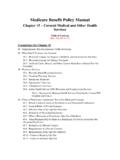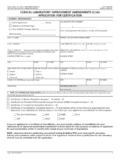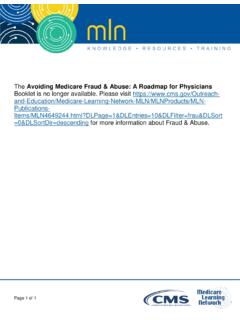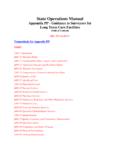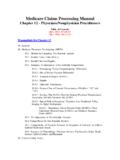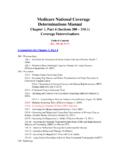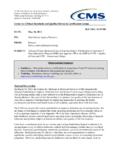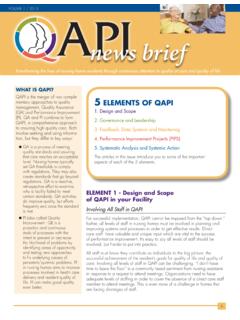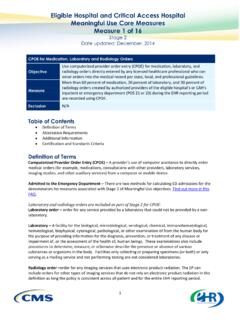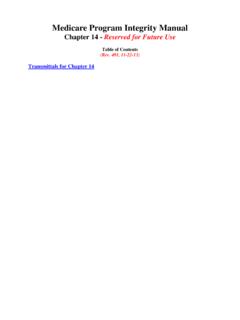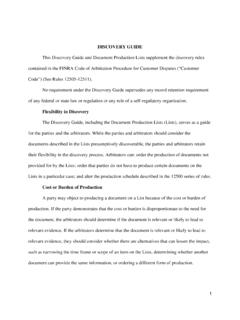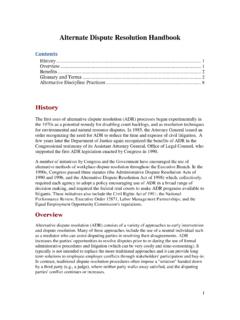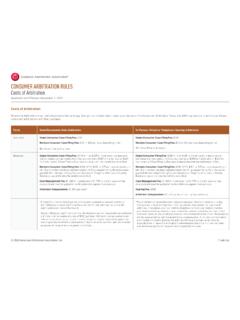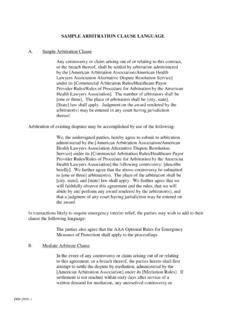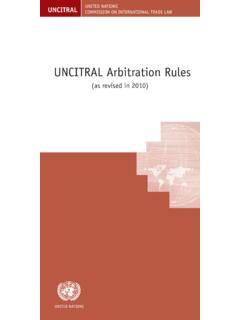Transcription of TECHNICAL GUIDANCE NO 2021-01
1 DEPARTMENT OF HEALTH & HUMAN SERVICES. Centers for Medicare & Medicaid Services 200 Independence Avenue SW, Mail Stop 739H. Washington, DC 20201. Center for Consumer Information & Insurance Oversight TECHNICAL GUIDANCE NO. 2021-01 . DATE: SEPTEMBER 30, 2021. SUBJECT: CALENDAR YEAR 2022 FEE GUIDANCE FOR THE FEDERAL INDEPENDENT. DISPUTE RESOLUTION PROCESS UNDER THE NO SURPRISES ACT. I. Introduction Section 9816(c) of the Internal Revenue Code (Code), section 716(c) of the Employee Retirement Income Security Act of 1974 (ERISA), and section 2799A 1(c) of the Public Health Service Act (PHS Act), as added by the No Surprises Act (NSA), direct the Departments of Health and Human Services (HHS), Labor, and the Treasury (collectively, the Departments) to establish a federal independent dispute resolution (IDR)
2 Process that nonparticipating facilities, nonparticipating providers, and plans and issuers may use following the end of an open negotiation period to determine the out-of-network rate for out-of-network emergency services and certain items and services provided by nonparticipating providers at in-network facilities, when a specified state law or All-Payer Model Agreement does not apply. Code section 9817, ERISA section 717, and PHS Act section 2799A 2(b), also added by the NSA, direct the Departments to establish a similar Federal IDR process that nonparticipating providers of air ambulance services, plans, and issuers may utilize following the end of an open negotiation period to determine payment for qualified services furnished by nonparticipating providers of air ambulance services where an All-Payer Model Agreement or specified state law does not apply.
3 1. The Departments issued interim final rules titled, Requirements Related to Surprise Billing; Part II to implement the Federal IDR process under the NSA. Under the Requirements Related to Surprise Billing; Part II, each party to an IDR payment determination under the Federal IDR. process must pay an administrative fee for participating in the Federal IDR process at the time the certified IDR entity is selected. The administrative fee is paid by each party to the certified IDR entity and remitted to the Departments. The administrative fee is established annually in a manner so that the total administrative fees collected for a year are estimated to be equal to the amount of expenditures estimated to be made by the Departments to carry out the Federal IDR.
4 Process for that year. 1. Section 102 of the NSA amends the Federal Employees Health Benefits Program statute to require each contract with a carrier to require the carrier to comply with the provisions of these sections of the Code, ERISA, and the PHS. Act. Accordingly, the Federal IDR process will be available to resolve eligible disputes involving FEHB carriers. The contents of this document do not have the force and effect of law and are not meant to bind the public in any way, unless specifically incorporated into a contract. This document is intended only to provide clarity to the public regarding existing requirements under the law. Additionally, under the Requirements Related to Surprise Billing; Part II, each party must also pay a certified IDR entity fee to the certified IDR entity at the time that party submits its offer.
5 However, the non-prevailing party is ultimately responsible for the certified IDR entity fee, which is retained by the certified IDR entity for the IDR services it performed. The certified IDR. entity fee that was paid by the prevailing party will be returned to the prevailing party by the certified IDR entity at the conclusion of the process. In the case of batched claims, 2 the certified IDR entity may make different payment determinations for each qualified IDR item or service under dispute. In these cases, the party with fewest determinations in its favor is considered the non-prevailing party and is responsible for the certified IDR entity fee. In the event that each party prevails in an equal number of determinations, the certified IDR entity fee will be split evenly between the parties.
6 If the parties reach a settlement before the certified IDR entity makes a payment determination, the certified IDR entity fee will be split evenly between the parties, unless the parties agree on an alternative method for allocating the certified IDR entity fee. The interim final rules also provide that, as part of its application for certification, the IDR entity must submit to the Departments the amount of the IDR entity fees it intends to charge for payment determinations, which are limited to a specific fixed IDR entity fee amount for single determinations and a separate fixed IDR entity fee amount for batched determinations. Each of these fixed IDR entity fees must be within a range set forth in GUIDANCE by the Departments, unless the certified IDR entity receives written approval from the Departments to charge an IDR.
7 Entity fee outside that range. The certified IDR entity may update its IDR entity fees and seek approval from the Departments to charge fixed IDR entity fees beyond the upper or lower limits for IDR entity fees annually. This GUIDANCE announces the administrative fee for participating in the Federal IDR process for calendar year 2022. This GUIDANCE also announces the allowable ranges for certified IDR entity fees related to single determinations and batched determinations for calendar year 2022. Finally, this GUIDANCE describes the information that IDR entities seeking certification and certified IDR. entities must provide to the Departments if they seek approval to charge certified IDR entity fees outside of the allowable ranges set by the Departments, and the process for providing that information.
8 II. Administrative Fee for Calendar Year 2022. The Requirements Related to Surprise Billing; Part II provide that the administrative fee amount will be established by the Departments in a manner so that the total administrative fees collected by the certified IDR entities and paid to the Departments during a calendar year are approximately equal to the estimated amount of expenditures by the Departments in carrying out the Federal IDR process for that calendar year. In setting the administrative fee for 2022, the Departments considered the estimated costs for the Departments to administer the Federal IDR. process for the calendar year, including the staffing and contracting costs related to certification and oversight of certified IDR entities; the costs of developing and publishing reports as required 2.
9 Batched determinations involve multiple qualified IDR items or services that are considered jointly as part of a one payment determination by a certified IDR entity for purposes of the Federal IDR process. The contents of this document do not have the force and effect of law and are not meant to bind the public in any way, unless specifically incorporated into a contract. This document is intended only to provide clarity to the public regarding existing requirements under the law. under Code sections 9816 and 9817, ERISA sections 716 and 717, and PHS Act sections 2799A- 1 and 2799A-2; the costs of collecting the administrative fees from certified IDR entities; and the costs of maintaining the Federal IDR portal.
10 Based upon this review of anticipated expenditures by the Departments in carrying out the Federal IDR process for 2022, for the calendar year beginning January 1, 2022 the administrative fee due from each party for participating in the Federal IDR process is $50. In future years, estimated costs will be informed by the actual costs incurred by the Departments to carry out the Federal IDR process. III. Certified IDR Entity Fee Range for Calendar Year 2022. The preamble to the Requirements Related to Surprise Billing; Part II states that the Departments will consider certain factors in setting the permitted certified IDR entity fee range, including the current IDR entity fees for state-managed IDR processes that are similar to the federal IDR process, the anticipated volume of the Federal IDR process, and the adequacy of the Federal IDR process capacity to efficiently handle the volume of IDR initiations and payment determinations.
